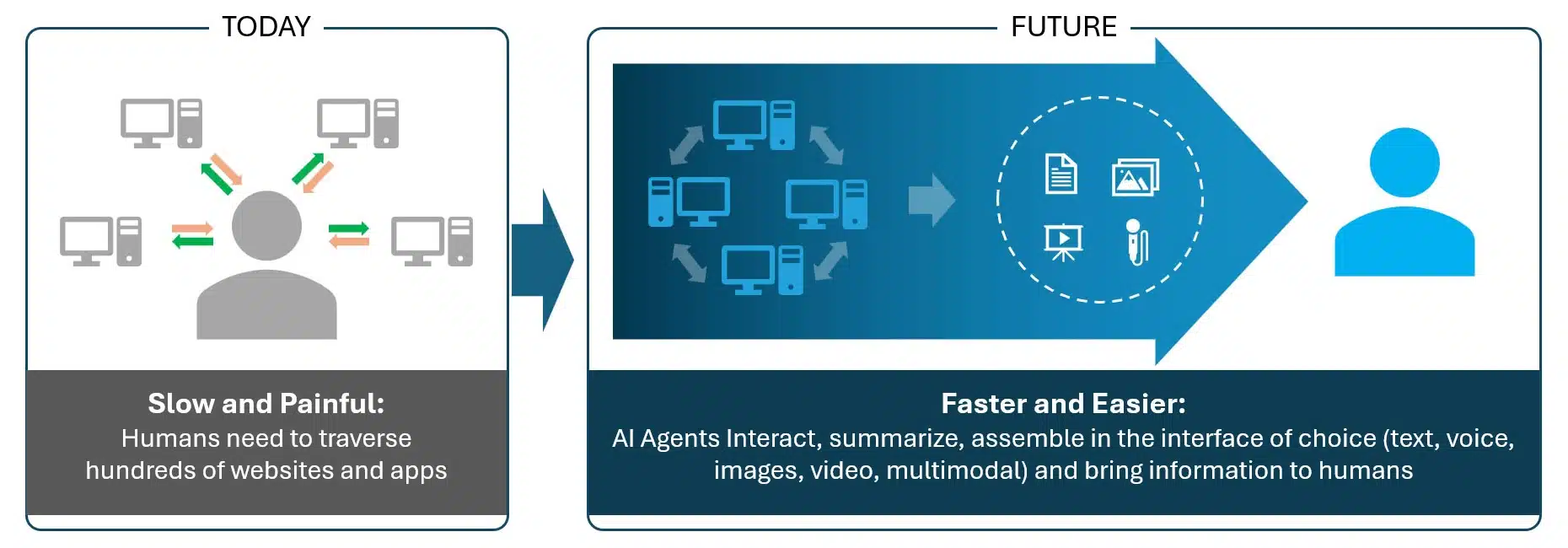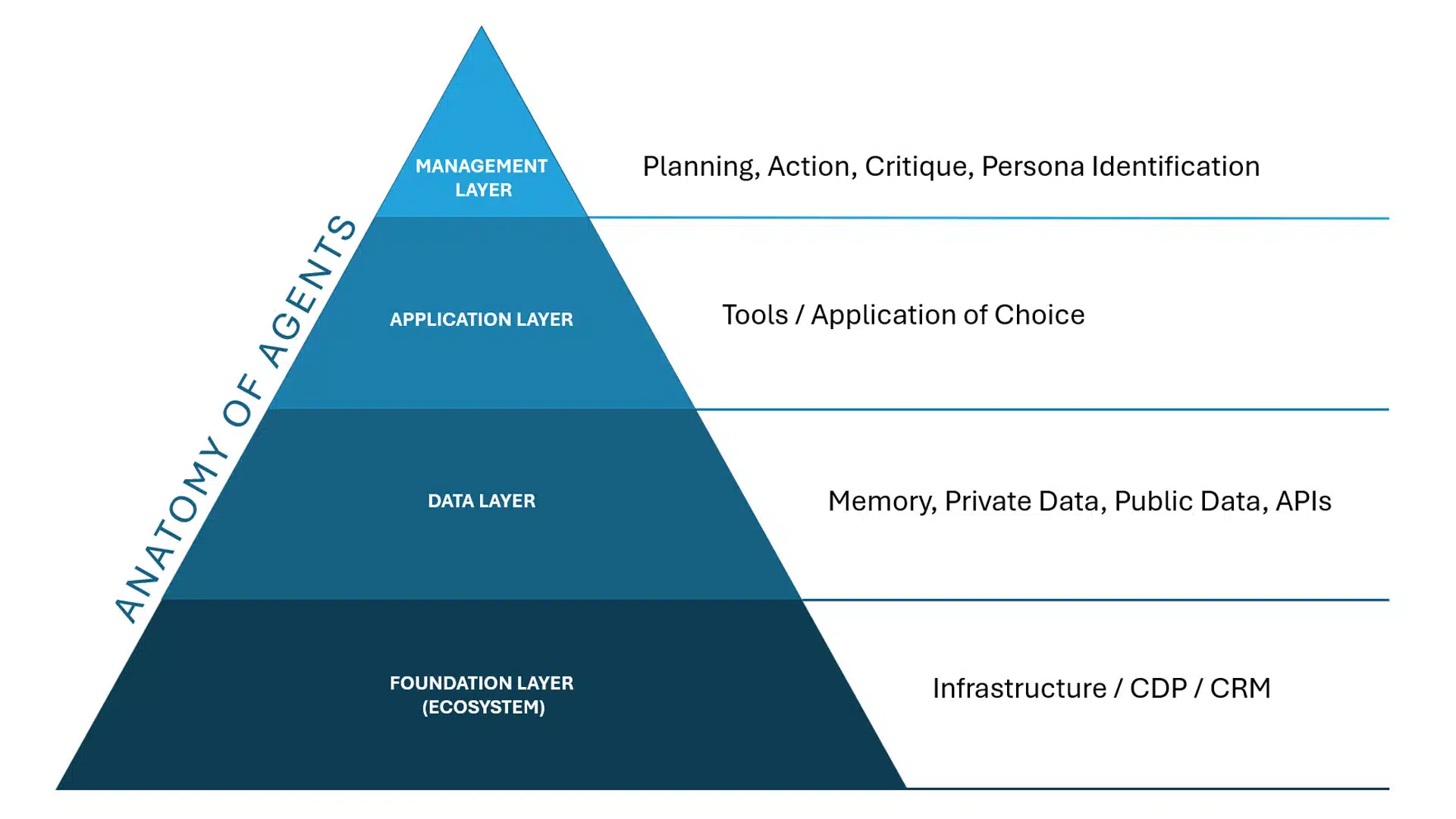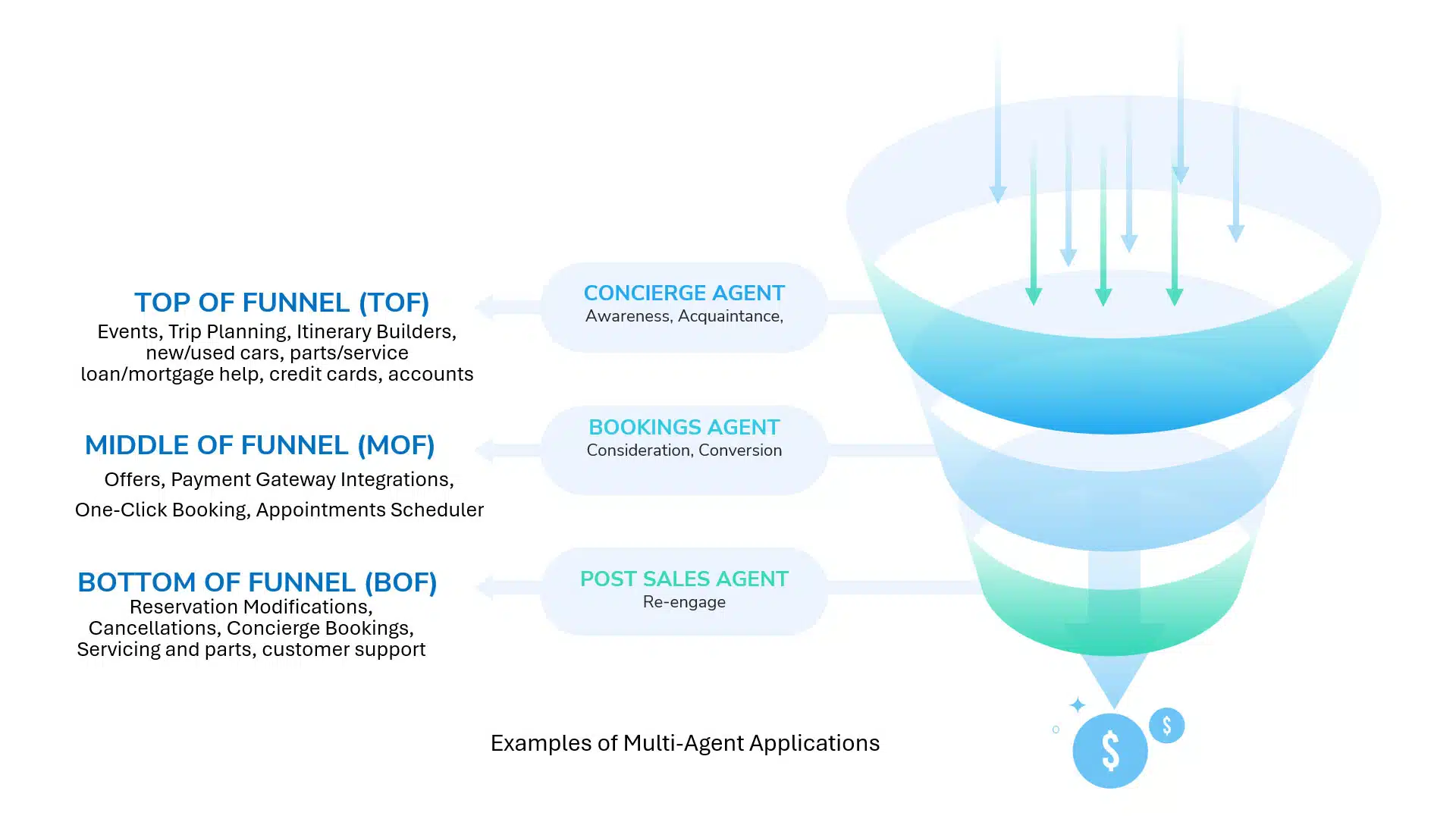From search to AI agents: The future of digital experiences
AI agents are redefining digital interactions. Find out how they enhance search, automate personalization, and drive business efficiency.
We rely on search engines to find information every day, but what if there was a better way?
Instead of manually gathering details from multiple sources, AI agents can do the heavy lifting for you.
They don’t just retrieve information. They analyze, organize, and personalize it in real time.
This article explores:
- How AI agents help businesses create more personalized customer experiences.
- The key components and frameworks behind AI-powered agents.
- How multi-agent systems can collaborate to solve complex tasks.
From information retrieval to intelligent problem-solving
AI agents represent a fundamental shift in how we interact with AI.
As brands, we are moving beyond passive information retrieval – a slow process of manually collecting data from various websites – to active problem-solving, where multimodal data seamlessly adapts to a preferred interface in real time.
Imagine a world where multiple independent AI agents collaborate to complete complex workflows.
Industry experts anticipate significant transformation due to AI agents. Here’s what they have to say:
- Satya Nadella: AI agents will proactively anticipate user needs and assist seamlessly.
- Bill Gates: AI agents are driving the most significant software transformation since graphical user interfaces.
- Jensen Huang: IT departments are managing AI agents the way human resources manage employees.
- Jeff Bezos: AI agents act as digital copilots, enhancing daily interactions.
- Gartner: Search engine volume will decline by 25% by 2026 as AI chatbots and virtual agents revolutionize customer interactions.
Today, brands have a significant opportunity to leverage AI agents as intelligent virtual teammates, enabling businesses to deliver hyper-personalized experiences.
As AI agents and technology evolve, we are moving away from the time-consuming effort of manually gathering information.
In the future, AI agents will interact with one another, collect relevant data, organize it to match user preferences, and deliver it seamlessly – creating a faster and more efficient experience.

Dig deeper: Mastering AI and marketing: A beginner’s guide
To understand how AI agents deliver these intelligent, real-time experiences, we need to break down their core components.
Let’s explore the anatomy of AI agents and how each layer contributes to their functionality.
Anatomy of AI agents
AI agents are designed to enhance the capabilities of LLMs by incorporating additional functionalities.
Agents have four layers:
- Foundation layer.
- Application layer.
- Management layer.
- Data layer.

An AI agent typically consists of the following components:
- Memory: Stores past interactions and feedback to provide contextually relevant responses. Memory resides in the data layer.
- Tools/Platform: Retrieves real-time data and interacts with internal databases. The chosen tools and platforms are part of the application layer.
- Planning: Uses reasoning techniques to break down complex tasks into simpler steps.
- Actions: Executes tasks based on insights from LLMs and other sources.
- Critique: Provides a feedback loop for actions based on different use cases to ensure accuracy.
- Persona: Adapts to different roles, such as research assistant, content writer, or customer support agent.
Planning, actions, critique, and persona identification occur in the management layer.
Frameworks for building AI agents
There are many frameworks available for building AI agents and multi-agent systems, each catering to a different need:
- AutoGen (Microsoft): Focuses on conversational AI and automation.
- CrewAI: Designed for role-playing agents that collaborate effectively.
- LangGraph: Structures agent interactions in a graph-based model.
- Swarm (OpenAI): Primarily for educational purposes.
- LangChain: A popular framework enabling AI agents to work with LLMs and other tools.
Each platform offers unique advantages based on the task’s use case, scalability, and complexity.
Multi-agent AI systems and their importance

A multi-agent system consists of multiple AI agents working seamlessly, each performing a distinct function to collaboratively solve problems.
These systems are particularly useful for handling complex scenarios where a single AI agent might struggle.
Below is a simple example of a multi-agent system:
- Query processing agent: Breaks the question into multiple parts.
- Retrieval agent: Fetches relevant data from internal sources.
- Validation agent: Verifies the response against various parameters such as brand voice and query intent.
- Formatting agent: Structures the response appropriately.
This structured approach to distributing responsibilities among agents ensures more accurate and intelligent responses while reducing errors.
Before exploring how AI agents deliver real-time personalization, let’s look at why traditional methods are no longer enough.
Dig deeper: AI optimization: How to optimize your content for AI search and agents
Why AI-powered personalization is essential
As data availability declines and user expectations rise, businesses can no longer rely on traditional methods to understand customer intent.
The shift away from third-party cookies, the rise of zero-click content, and the demand for real-time, tailored experiences have made AI-driven personalization a necessity.
AI enables businesses to analyze behavior, predict intent, and deliver dynamic, personalized experiences at scale – from search and social to email and on-site interactions.
Unlike static personalization, AI adapts in real time, ensuring relevance across every customer touchpoint.
With traditional strategies losing effectiveness, AI agents offer a smarter, more scalable way to engage and convert audiences.
Dig deeper: How to boost your marketing revenue with personalization, connectivity and data
Delivering personalized experiences with search and chat agents
Modern websites are no longer one-size-fits-all. They provide immersive experiences tailored to each visitor’s intent.
AI agents enable this through two key approaches:
Search agents
Traditional site searches relied on keywords and filters, which have limitations with multimodal searches (like voice or visual) and long-tail queries.
They also require more user clicks, increasing the likelihood of search abandonment.
AI-powered search agents overcome these challenges by delivering a more intuitive and efficient on-site search experience.
Chat agents
Early AI chatbots responded using pre-programmed scripts or existing website content.
Today, advanced chat agents offer personalized experiences using audience data. They can:
- Build detailed user profiles.
- Understand user intent by analyzing historical interactions and purchase data.
- Learn from similar interactions to ask relevant follow-up questions.
- Adapt on-site experiences in real time based on user behavior.
- Inform cross-channel marketing strategies – such as email, social, paid, and retargeting – using insights gathered from user interactions.
AI agents also offer industry-specific personalization. Brands can implement:
- Digital marketing automation agents.
- Customer support chat agents.
- Specialized solutions, like:
- Financial risk assessment agents.
- Automotive inventory management agents.
Personalize or perish
Many businesses still view personalization as optional.
In reality, without personalized experiences, traffic and conversions will decline, leading to higher marketing costs and lower ROI as more spending is needed to attract, engage, and convert visitors.
To improve efficiency, AI-powered personalization offers a scalable, intelligent, and adaptive solution.
Dig deeper: Hyper-personalization in PPC: Using data to deliver tailored ad experiences
Contributing authors are invited to create content for Search Engine Land and are chosen for their expertise and contribution to the search community. Our contributors work under the oversight of the editorial staff and contributions are checked for quality and relevance to our readers. Search Engine Land is owned by Semrush. Contributor was not asked to make any direct or indirect mentions of Semrush. The opinions they express are their own.


